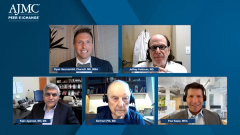
Unmet Needs in CKD Therapy
Paul Sapia, MHA, focuses on the gaps in care that are seen within CKD treatment.
Episodes in this series

Ryan Haumschild, PharmD, MS, MBA: I’d like to pivot to Paul, who I think is an expert in the managed care space and really understands how we bring together these clinical treatments with these economic considerations. Paul, when you think about it from your perspective, what gaps in care exists for patients with CKD, and how do these gaps differ from early stage to late stage when we’re looking at the treatment landscape?
Paul Sapia, MHA: I appreciate you asking me to be a part of this panel with these great panelists. One of the things that was mentioned by a couple of my fellow panelists here is the members or the patients knowing they have CKD. That’s one of the biggest barriers is making sure that we’re doing the screenings at the provider office, and we’re understanding those chronic disease conditions that lead to end-stage renal or chronic kidney disease. We start to look at access to health care for members. That’s a big gap in care for a lot of people, especially in lower income communities that don't have a primary care physician. They don't have a medical home, so they don't have that person that is continually guiding and watching for those markers to continue to progress. That’s part of it. When we look at rural communities as well, there’s a very big lack of specialists, so when somebody is identified as a potential patient with kidney disease, making sure they’re getting to the right type of care is another. In my world of dealing with determinants of health, we understand that there are communities that are lacking food or healthy food options. That leads to chronic disease, leads to kidney disease, heart disease. We are looking at addressing the community issues, and we can start at the community and understand where those food desserts are, where we can provide access to food, and then what part as a payer do we play in helping patients get food. If they’re in a situation, they don't have enough food, and we’ve screened for food insecurity, let’s make sure that they have healthy food and access to that food. We also want to make sure we help them understand how behavior change plays a big part in this as well. When you understand that you’re stage 2 in kidney disease, how do we change behaviors? How do we eat better? How do we exercise and take care of ourselves so it doesn’t progress as quickly, and it doesn’t turn into later stages? Those are a lot of what we look at as the disease progresses. Those barriers become a little bit more intense because we’re having to deal with different types of food and different things to treat those members, making sure they’re staying adherent to their medication. It also progresses in the mental health challenge as well, as we start to look at whole health. It’s addressing the physical challenges, as well as those mental challenges. When somebody gets diagnosed with a chronic kidney disease, there are a lot of issues that come with that, depression and anxiety. How do I take care of that? We need to start addressing that and looking at the caregivers as well. How can we assist that, how can we help for mental health challenges on that part? I’ll let my clinical experts on the panel talk about the clinical end, but as we start to look at those health-related social needs, those are the things that are the biggest gaps. Those are where we can make a difference, and screening at the provider office, helping them understand the proper types of screenings and where the members are that need to get screened, those diabetic patients, those prediabetic patients at screening. Closing the loop and making sure we’re providing some care and some access to food or other resources that are going to help those members. That’s what we look at on the social determinant of health side as we are starting to look at those health-related social needs, the barriers that exist in community and how we head them off a little earlier.
Ryan Haumschild, PharmD, MS, MBA: Paul, I really appreciate you touching on a lot of those factors because when we think about diversity, equity, inclusion, social determinants of health is a huge portion of that. How do we create care pathways for unique patient populations that might have greater needs or might have better responses to therapies earlier on? You talked about food insecurity. I know also transportation vulnerability. We can now figure out what is a patient’s transportation vulnerability just by looking at the zip code with which they live. So much data that we can start leveraging to make decisions that kind of wrap around the patient. I’m so glad you brought that up. As we talk about this a little bit further, I want to pivot quickly to Dr. Feldman to get his input as well on this topic, as he deals with a lot of these patients.
Jeffrey Feldman, MD: We have for the last 3 years had a large care coordination team, we all meet together. On the social determinants of health, there are 14 or 15 perimeters, and whilst everything that Paul said was correct with screening for depression, behavioral health, one of the things we most identified is transportation. Transportation is a big one, and I hope that some of the newer Medicare Advantage can provide transportation for our medical visits and decrease the no-shows.
Transcript edited for clarity.
Newsletter
Stay ahead of policy, cost, and value—subscribe to AJMC for expert insights at the intersection of clinical care and health economics.









